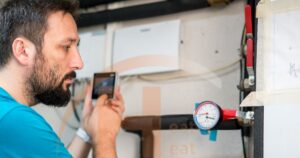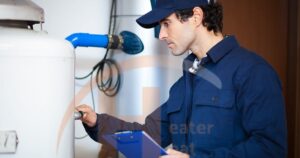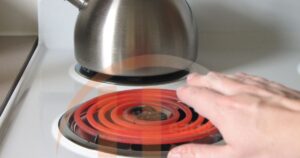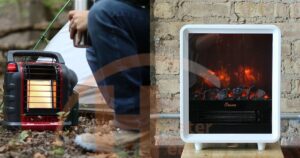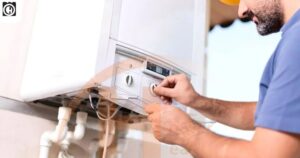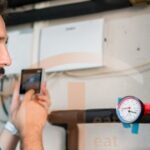When determining your heater type, look for a gas connection or an electric plug nearby. Identifying this crucial distinction ensures you choose the right maintenance and troubleshooting steps for your specific heater.
Unlock the secret to efficient water heater care by distinguishing between gas and electric models. Ever wondered what powers your hot showers? In just a glance, you can save time and ensure optimal performance. Join us on a quick journey to identify the heart of your water heating system, paving the way for hassle-free maintenance.
Knowing if your heater is gas or electric is key to proper maintenance. Gas heaters use a flame, while electric ones rely on heating elements. Check for a visible flame or an electric cable to identify your unit. This quick identification ensures you provide the right care for a reliable and efficient hot water supply.
Understanding Water Heater Types

Water heaters come in different types to meet various household needs. The most common ones include tankless, storage tanks, and heat pump heaters. Tankless heaters heat water on demand, providing hot water instantly, while storage tank heaters store and maintain a fixed amount of hot water. Heat pump heaters use electricity to move heat from the air or ground to heat water efficiently.
Each type of heater has its pros and cons. Tankless heaters save energy by only heating water when needed but may have a higher upfront cost. Storage tank heaters are cost-effective but continuously use energy to keep water hot. Heat pump heaters are energy-efficient but may be less effective in colder climates. These differences helps homeowners choose the right heater type based on their preferences and requirements.
Identifying a Gas Water Heater

Recognizing a gas heater is uncomplicated. Locate a unit connected to a gas line, commonly found in utility areas. It typically has a thermostat for temperature control. Look for a venting system to expel combustion gases safely.
Look for a Natural Gas Supply Line
Discovering a natural gas supply line is straightforward. When looking for it, focus on finding a metal pipe with a threaded connection in your utility area, typically linking to gas appliances. Ensure safety by being aware of the distinct odor of natural gas. It is usually odorless, but an added scent aids in leak detection.
Check for a Pilot Light
To check for a pilot light, inspect your gas water heater. Look for a small, continuous flame near the unit’s bottom. This signals the presence of a functional pilot light, which is crucial for heating water effectively.
If the pilot light is not visible, consult your appliance manual for relighting instructions. Maintaining a steady pilot light ensures the efficient operation of your heater, ensuring a constant and reliable supply of hot water.
Identifying an Electric Water Heater

Identifying an electric water heater is simple. Look for a tank, electrical connections, and a thermostat. These key features distinguish it from other types of heaters.
Look for an Electrical Supply Cord
Identifying an electric water heater is a simple process. The presence of these components distinguishes an electric heater from other types in the market.
Take a closer look at an electrical supply cord connected to the unit. This cord serves as a vital link to the power source, usually an electrical outlet. If you spot this cord during your inspection, you can be confident that you’ve identified an electric heater, as it is a distinctive feature of this type of appliance.
Check the Access Panel
When you want to ensure it’s an electric water heater, check the access panel. Electric heaters usually have a removable panel on the front with electrical elements inside. If you find coils or wires, you’ve likely located an electric heater.
This access panel allows for maintenance and repairs, making it a crucial element in identifying and maintaining your heater. Regular checks of this panel can help ensure the efficient functioning of your heater and address any issues promptly.
Gas vs. Electric Energy Usage

Electric vs Gas water heaters use different sources of energy. A gas heater heats water by burning natural gas or propane. It has a pilot light that ignites the gas burner, heating the water in the tank. On the other hand, an electric heater uses electricity to heat water through electric resistance elements inside the tank.
When comparing energy usage, gas heaters are often more energy-efficient than electric ones. This is because burning gas directly produces heat, while electric heaters need to convert electricity into heat. The overall efficiency depends on factors like local utility rates and the cost of the energy source.
Is the Water Heater Gas or Electric
Identifying whether a water heater is Gas or Electric can be done through a few simple observations:
Look for a blue flame pilot light

When checking if your water heater is gas-powered, look for a blue flame pilot light. A steady blue flame indicates that the gas combustion is normal and the heater is functioning properly.
If the pilot light is yellow or flickering, it may signify an issue with combustion, such as a lack of oxygen or a dirty burner. In such cases, it’s advisable to consult a professional to ensure the safe and efficient operation of your gas heater.
Look for an electric supply cord
To check if your appliance is electric, start by looking for an electric supply cord. This cord typically has a plug that connects to an electrical outlet. If you find a cord attached to your device, it’s a clear indicator that it operates on electricity.
Inspect the end of the cord to confirm it has prongs for plugging into an outlet. If so, your appliance is electric, and you should ensure the power source is functioning properly for efficient operation.
Look for a black or copper pipe
To identify if your water heater is gas-powered, check for a black or copper pipe connected to it. Gas heaters typically have a gas supply line that runs into the unit through these pipes. If you spot this distinctive piping, it indicates the use of natural gas or propane for heating.
Electric heaters don’t have a gas supply line and rely on electrical power. Instead of black or copper pipes, you’ll find electrical wiring connected to the heater. So, a simple visual inspection of the pipes can help you determine the energy source of your heater.
Look for a vent pipe or chimney
To identify if your water heater is gas-powered, check for a vent pipe or chimney near the unit. Gas heaters require proper ventilation to expel combustion byproducts, and a visible venting system is a clear indicator of their presence.
A vent pipe or chimney is essential for safely directing gases produced during the water heating process outdoors. If you spot one connected to your heater, it’s a strong indication that your appliance operates on gas, emphasizing the importance of adequate ventilation for efficient and secure functionality.
Pros and Cons of Electric and Gas Water Heaters

Electric and gas water heaters are two common types of heaters used in households. Each type has its own set of advantages and disadvantages. Here’s a breakdown of the pros and cons of electric and gas heaters:
Pros of Electric Heater
- Space-efficient compact design.
- Cost-effective upfront investment.
- Reliable and consistent hot water.
- Efficient energy-to-heat conversion.
- Enhanced safety with no combustion.
- Simplified setup, no ventilation needed.
- Flexible installation in diverse locations.
- Durable, ensuring an extended lifespan.
- User-friendly operation with minimal maintenance.
- Lower environmental impact, and reduced emissions.
Cons of Electric Heater
- Limited hot water capacity.
- High initial installation cost.
- Longer heating time compared.
- Potential energy efficiency concerns.
- Dependence on electricity availability.
Pros of Gas Heater
- Reliable in cold climates.
- Quick hot water production.
- Long lifespan with proper care.
- Cost-effective initial installation.
- Lower upfront equipment costs.
- Continuous hot water availability.
- Simple maintenance requirements.
- Energy-efficient heating technology.
- Compatibility with existing gas lines.
- Faster water heating compared to electric.
Cons of Gas Heater
- Finite hot water supply.
- Susceptible to heat loss.
- Combustion emissions pollute indoor air.
- Requires proper ventilation infrastructure.
- Limited efficiency increases energy costs.
Identifying Other Types of Water Heaters
When it comes to water heaters, there’s more than just the familiar tank style. Explore various options like tankless and heat pump heaters, each offering unique benefits for efficient and tailored hot water solutions. Identifying the right type for your needs ensures both comfort and energy savings in your home.
Tankless Water Heaters

Tankless water heaters, unlike traditional tanks, heat water on demand, providing a constant supply of hot water without the need for storage. These compact units are energy-efficient as they only operate when hot water is needed, reducing standby heat loss and lowering utility bills.
Installation of tankless heaters is often more flexible, allowing them to fit in smaller spaces and providing the convenience of hot water closer to the point of use. Additionally, these systems have a longer lifespan compared to traditional tanks, making them a durable and cost-effective choice for those looking to upgrade their water heating setup.
Solar Water Heaters

Solar water heaters harness the power of the sun to provide an eco-friendly and cost-effective way to heat water. These systems typically consist of solar collectors, which absorb sunlight, and a system to transfer the collected heat to the water. As a renewable energy source, solar heaters contribute to reducing reliance on traditional fossil fuels, lowering both energy costs and carbon footprints.
With various types available, including active and passive systems, solar heaters can be adapted to different climates and needs. While initial installation costs may be higher, the long-term savings and environmental benefits make them a sustainable choice for homeowners seeking greener energy solutions.
Heat Pump Water Heaters
Heat pump water heaters are energy-efficient appliances that move heat from the air or ground to heat water, making them a cost-effective and environmentally friendly choice. By leveraging ambient heat, these systems can provide hot water at a fraction of the cost of traditional electric heaters, making them an attractive option for households looking to save on energy bills.
These heaters work by extracting heat from the surroundings and transferring it to the water, offering significant energy savings. While they may have a higher upfront cost, the long-term efficiency and lower operational expenses make heat pump heaters a smart investment for those prioritizing sustainability and reduced utility expenses.
Conclusion
Discerning the energy source of your water heater, whether it be gas or electric, holds paramount importance for effective maintenance and safety precautions. This knowledge empowers homeowners to conduct routine inspections and troubleshoot potential issues accurately.
The distinction between gas and electric heaters also influences the nature of repairs and maintenance tasks, allowing for a more targeted and efficient approach. Awareness of the specific type of heater enhances communication with professionals during repairs or installations, ensuring they are well-equipped to handle the task at hand.
Regular checks and informed decision-making contribute to the longevity and optimal performance of your water heating system. Ultimately, identifying whether your water heater is gas or electric is a fundamental step toward maintaining a reliable, energy-efficient, and secure hot water supply in your home. Stay informed and proactive to enjoy the benefits of a well-functioning water heating system.
Frequently Asked Questions
How can I tell if my heater is gas or electric?
Check for a gas supply line or an electric power cord connected to the unit. This information may also be in the user manual.
Are there visual cues that indicate a gas heater?
Yes, look for a visible gas burner assembly or a gas supply line connected to the heater.
What signs suggest that a heater is powered by electricity?
The presence of an electric power cord and the absence of a gas supply line are key indicators of an electric heater.
Can I find details about my water heater’s type in the user manual?
Yes, the user manual typically contains information about the energy source and type of your heater.
Is there a simple test to confirm whether my heater is gas or electric?
Yes, you can visually inspect the unit for a power cord (electric) or a gas supply line (gas) connected to the heater.

Mark Edward, with 6 years of expertise in Electric Heaters, is the author at heaterheat.com. His in-depth knowledge provides valuable insights into efficient heating solutions, making him a trusted resource.


